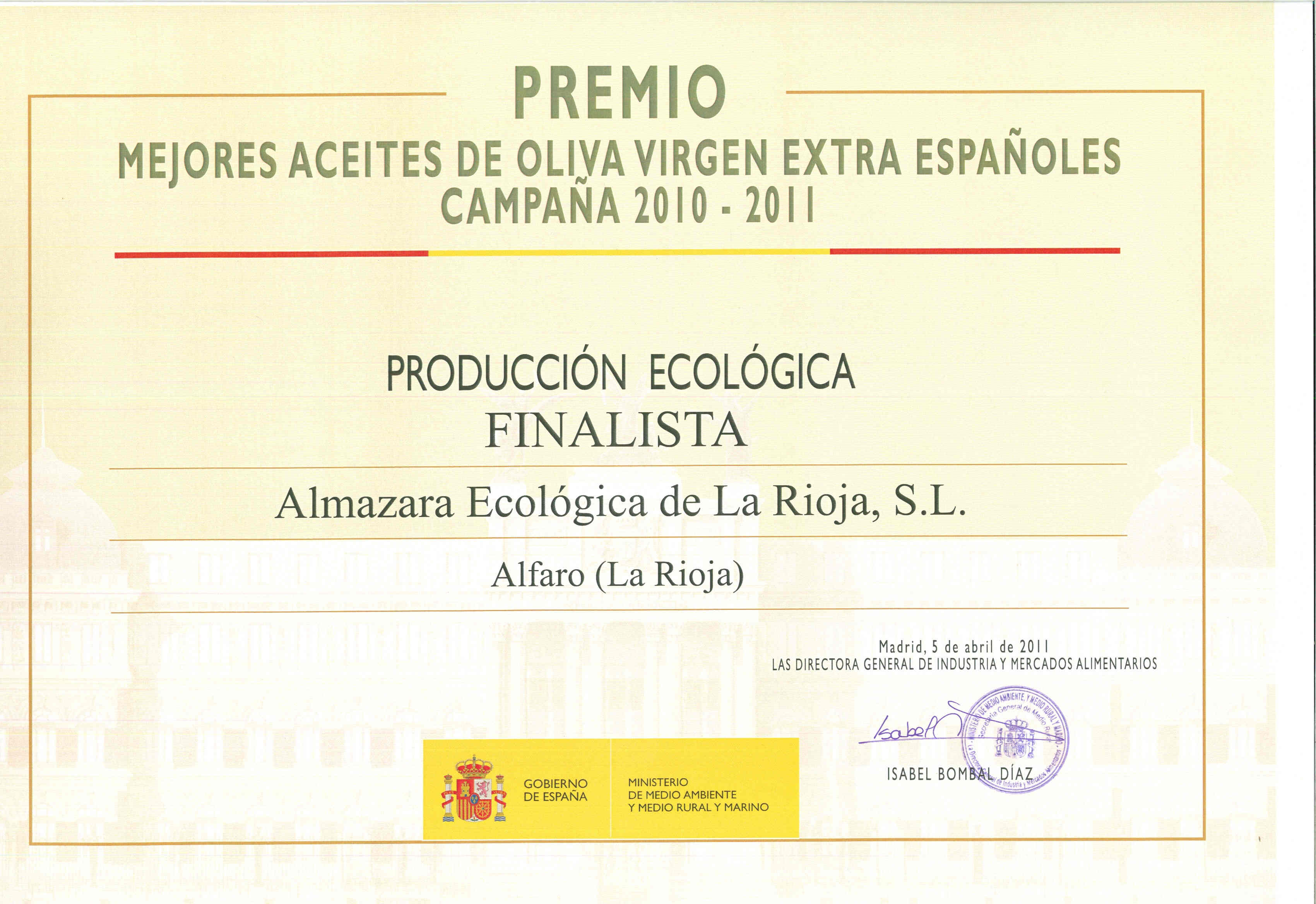 Loading... Please wait...
Loading... Please wait...Categories

電話:
(+852) 3112 0750
Whatsapp:
(+852) 6415 2908
微訊:
Spanishchino
面書:
Spanish Chino Co Ltd
電郵:
[email protected]
- Home
- Manufacture Info
- Graccurris (Olive oil)
Graccurris (Olive oil)

Graccurris:
We are a family run company involved in the olive cultivation business. Our concern and interest in the environment mean that our olives are grown using organic farming methods i.e. without the use of chemical fertilizers, weed-killers or any other product that causes toxic residues. Regular samples of our crops are taken by the controlling authorities and analyzed in official laboratories.
These tests then authorize our use of the logo that annually certifies the denomination of Organic Farming License nº RI-0017-P
At the time of our first harvest we realized that our efforts in organic cultivation were somewhat fruitless as the only oil presses available to use were not nature friendly and didn't avoid the use of the olive remains (alpechin) and gave more importance to oily performance than quality.
We therefore decided to construct a small olive oil factory in order to control the whole process and thus ensure an extra virgin olive oil which is both organic and of the very best quality. License of Organic Oil Mill nº RI-1012-E
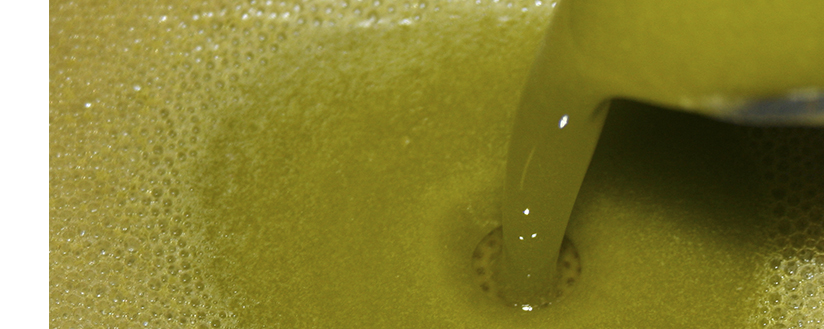
HOW IT’S MADE
1- ORGANIC CULTIVATION. We till the olive using organic farming methods, which doesn't allow the use of chemical fertilizers, weed-killers or any other product that generates toxic residues which act against the environment. Also, We only plant the tree in low density condition (Distance of every olive tree: 6m x 6m) and It keep every tree have the best nutrition from the ground.
2- HARVESTING. We harvest manually and mechanical, rejecting any olives which are found on the floor which are over-mature or already broken.
3- WASHING. We clean the olive, stripping off the leaves and the small branches.
4- CRUSHING. The purpose of the grinding is to break the olive tissues and release drops of oil. We grind the olives as they are collected. The process takes place slowly to prevent any heating damage nutrition in the olive oil.
5- MIXING. Mixing is one of the most important processes. It brings together in one continual phase the drops of oil dispersed in the crushed paste. We control the temperature and we do not add water. As a result the paste is more difficult to work with and less oil is obtained, though there are no negative alterations in quality or aroma loss.
6- DECANTER. After the mixer the paste is sent to the decanter in order to be separated into it's two phases. One of the phases is composed of solids or vegetation water (orujo), and the other phase is oil. We would like to point out that to obtain only the best oil we do not force the separation, and so some oil is lost in the orujo. With the two phase system we eliminate any dumping of the final olive remains(alpechin) which causes much pollution and seriously harms the environment. The crushing, mixing and separation is carried out in cold conditions to guarantee the preservation of the vitamin and aroma properties. We control the temperature.
7-TANKS. The oil is put into sealed stainless steel tanks and kept at a 15ºC / 20ºC.
The oil decants its moisture, sediments and other impurities which settle at the bottom of the tanks and are regularly removed.
8-NO FILTERING. After the oil has decanting a natural way we package it without filtering to avoid any loss of vitamins or antioxidants.
9-PACKAGING AND CASING. We have chosen glass packaging, as they are excellent materials for oil preservation, to prevent any loss in quality caused by light or heat.
All the machines that intervene in the process are made of stainless steel. Stainless steel receives a high category status in the food industry as it has a high mechanical and corrosive resistance, meaning a total absence of particle release.
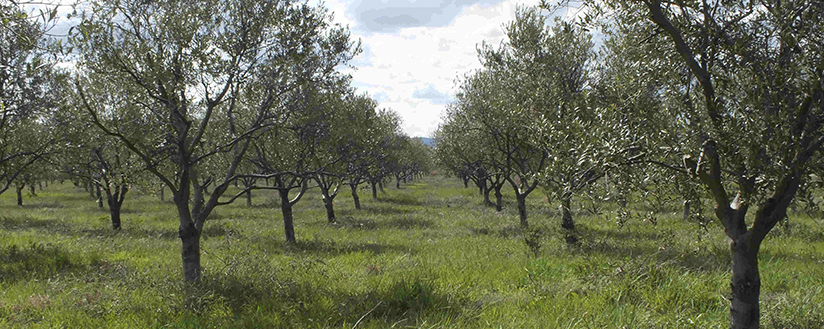
RECOMMENDATIONS
The quality of extra virgin olive oil is determined by, the climate, the agricultural land, the healthy olive, immediate grinding of the olive once it is picked, cold manufacturing, and appropriate storage. The failure of just one of these stages means an irreversible loss in quality.
The oil is packaged without filtering to prevent wastage of its taste and smell characteristics, so small olive particles may appear in the bottom of the bottle.
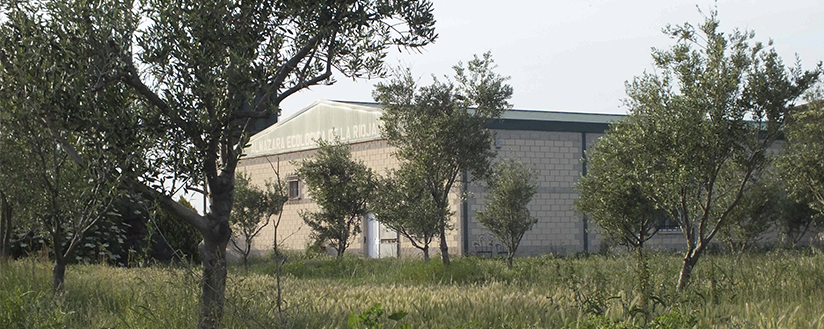
WHAT MAKES US DIFFERENT
Cultivation, Processing and Packing of: Organic Extra Virgin Olive Oil
Health Regn. No.: 16.03129/LO
Register of Food Industries: 26/44337
Licence of Organic Oil Mill: RI/1012/E
Licence of Organic Agriculture RI-98/0017/P
Fundamental ideas about our project:
1. Our olive oil is meant fundamentally dealing with High Quality and/or Organic Foodstuffs.
2. Ours is a Family Company, managed by three brothers on the estate founded by our parents. Never be international company, everything profit first.
3. The cultivation of the olive trees and the processing of the oil are totally ORGANIC.
4. Excellent data:
Organic Extra Virgin Olive Oil
This is a genuine, quality food possessing a pleasant palate and all the requirements that constitute excellent nutritional value.
Analytical:
|
Parameter |
Our data |
Maximum allowed in Extra Virgin Olive Oil |
|
Acidity |
0.14 |
0.8 |
|
Peroxide |
4.04 |
20 |
|
K270 |
0.13 |
0.20 |
|
K232 |
1.70 |
2.50 |
|
Wax |
51 |
150 |
Taste: Aftertaste of almonds, very pleasant and intense. Sweet and fruity on the palate. Slight spice.
5. We are situated in La Rioja (known worldwide for its wines) and we have been pioneers in recovering the cultivation of olives (abandoned for more than 60 years), and we have demonstrated the excellent characteristics of the oil of La Rioja.
The Government of La Rioja, is at the moment showing great interest in promoting this food article.
6. We recommend the consumption of our olive oil uncooked, because of its excellent taste (flavor and odor) it is excellent for fish and salad dressings.
Recent Award
ECOTRAMA 2013 Cordoba-Andalusia (Spain)
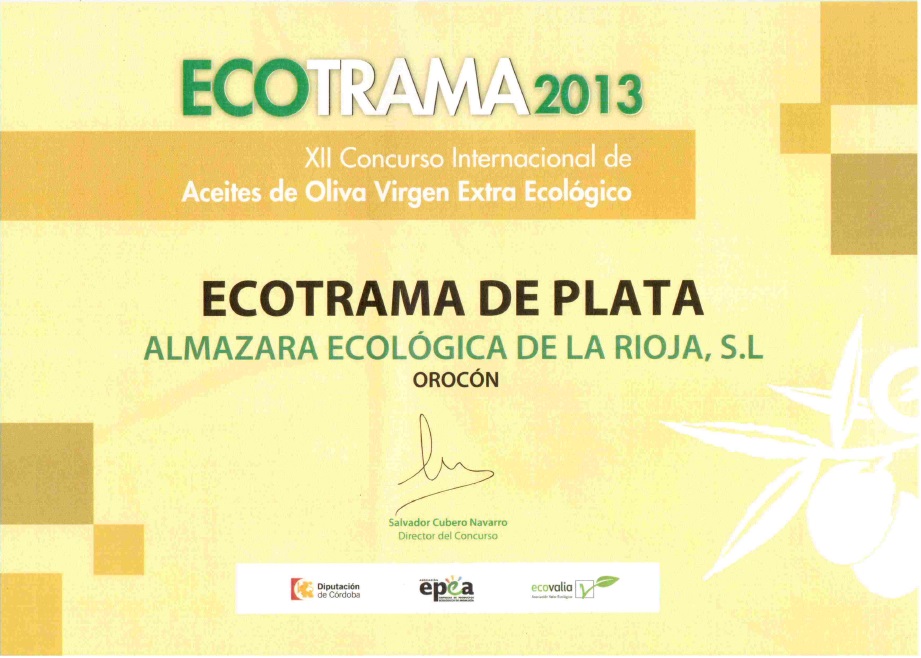
TOP 25 BIOPRESS 2012 Germany
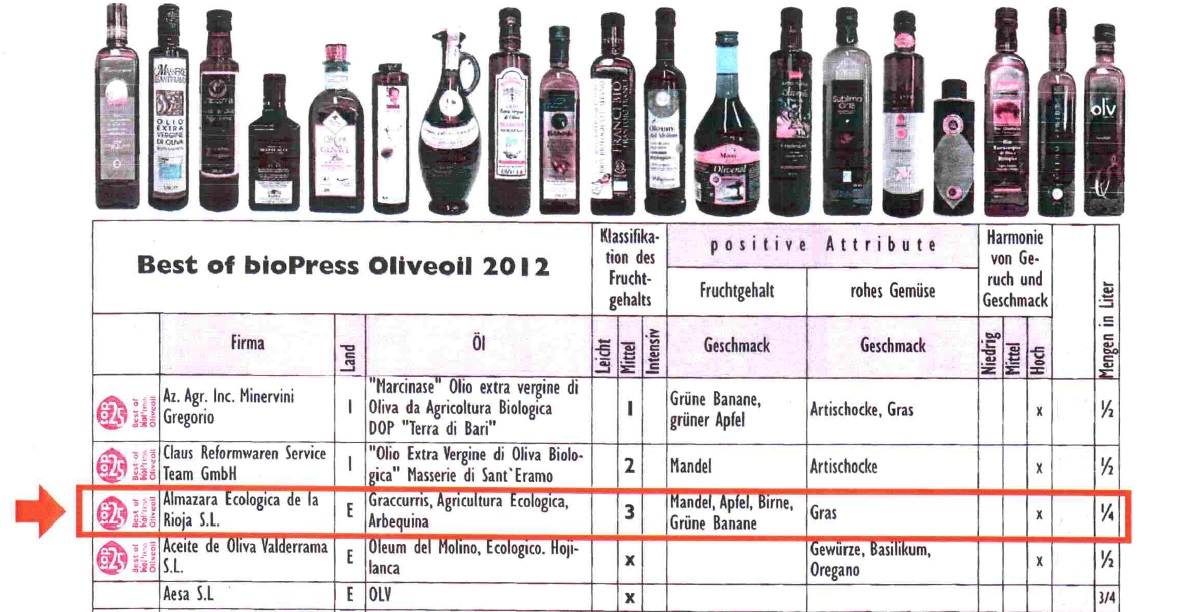
ECOVIURE 2012 Manresa-Catalonia (Spain)
ECOTRAMA 2011 Cordoba-Andalusia (Spain)
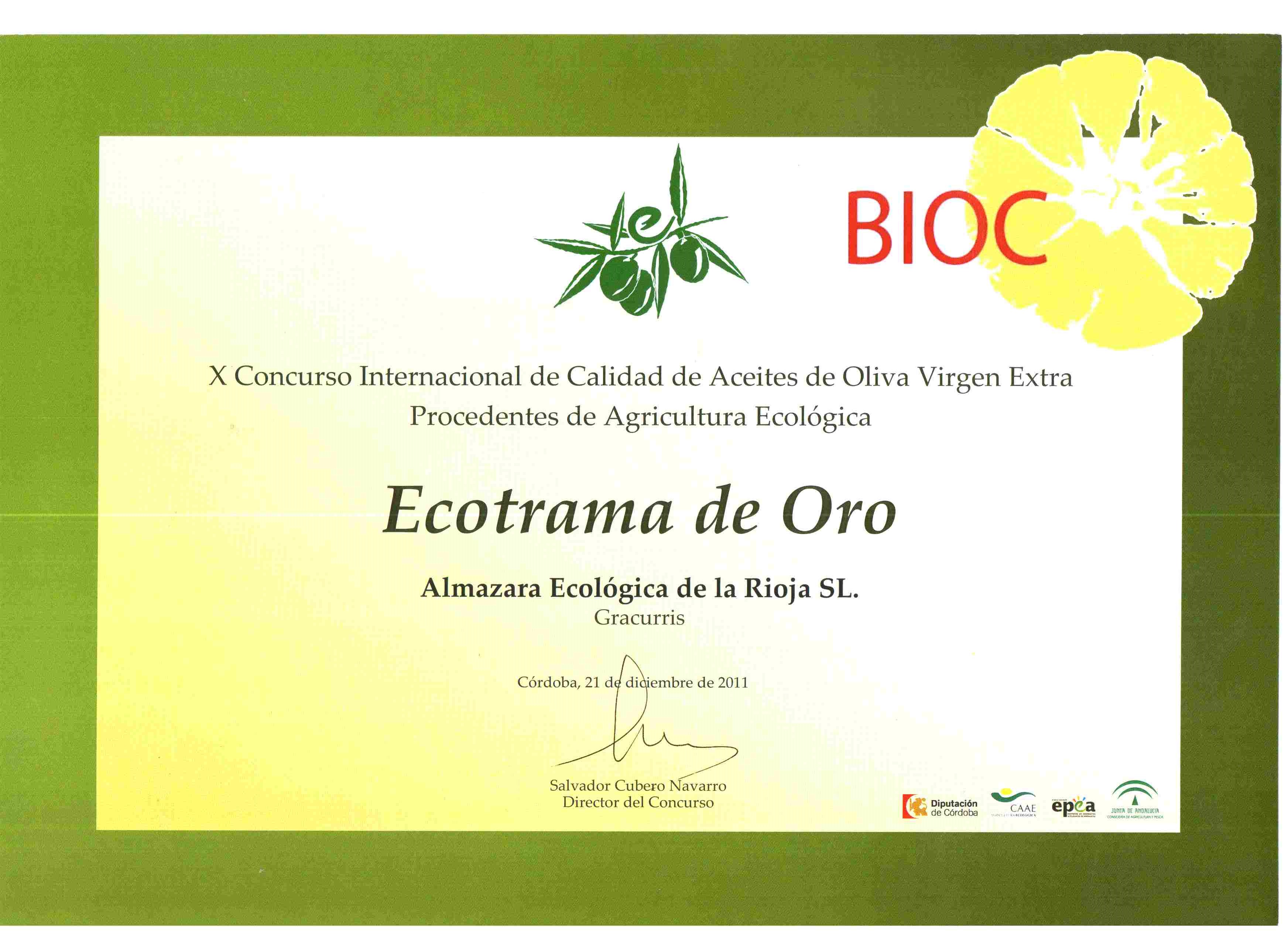
The Ministry of Agriculture and Food of
the Spanish Government 2011 (Spain)
